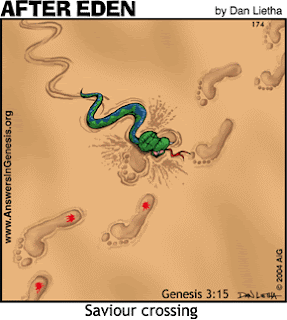Advent: What is the Protoevangelium?
Genesis 3:15
15 And I will put enmity
Between you and the woman,
And between your seed and her Seed;
He shall bruise your head,
And you shall bruise His heel.”
As we are looking at the advent season and reflecting on the first coming of the Lord Jesus Christ, let us look back at the very first Messianic prophecy of the Scriptures, Genesis 3:15. As some of you may know if you have read this chapter before, this recalls the account of the fall of man. Adam and Eve had sinned against God by partaking of the tree of the knowledge of good and evil. When approached by God, they continued in their sin by passing the blame onto the next person with Adam even boldly blaming it on God Himself. When Adam and Eve realized they had sinned, they realized their nakedness and attempted to “cover up” their own sin with fig leaves. Of course, this was not appropriate enough, another covering had to be made.
Adam and Eve both knew what the ultimate punishment was, death. God however upholds that plus utters the additional turmoil they will go through. When God gets to Satan in the form of the serpent, God gives not just a curse upon Satan himself, but gives mankind hope in verse 15 through what many theological scholars call, “the Protoevangelium” or “first gospel” when we break down the Greek, protos and evangelium, “first” “good news”.
So, you may be asking, “Ok Josiah, I thought we were supposed to be talking about the prophecies of Jesus’ birth and their fulfillment. Well, we are, and this is the first one. It speaks of the virgin birth of Christ. The reference to the "seed of the woman" as being Jesus is believed to be a prophecy of the virgin birth of the Messiah. Elsewhere in the Bible, a child is referred to as the "seed" of his father, exclusively. For example, Jesus is called the "seed of David" at Romans 1:3, and the whole nation of Israel is referred to as the "seed of Jacob" at Jeremiah 33:26. In Genesis 38:9 it also speaks of seed in the account of Onan. For the Messiah to be called the "seed of woman", therefore, is interpreted to mean that the Messiah will have no earthly father. This is stressed even more with its usage. Notice it only says seed and not seeds. This speaks of the virgin birth. Seed is also capitalized, letting us know that the usage of his was to announce a special birth, a holy birth, the Messiah. So, in the very first prophecy of Christ, given at the time that we needed it the most, the fall of man, we are given hope in a coming Messiah.
The final part of the verse can also be translated in this way, the word "He shall crush thy head and thou shalt bruise His heel."
The reference to the bruising of the serpent's head refers to a number of biblical topics. Primarily, it speaks of the defeat of Satan, both spiritually and eschatologically. The defeat of Satan, when spoken of together with Christ's work, usually begins with the crucifixion. At the cross, Satan's power over mankind is undone, and so in a spiritual sense, he is defeated. In eschatology, the study of the end times, Satan's defeat comes when he is cast into the lake of fire. "And the devil who had deceived them was thrown into the lake of fire and brimstone where the beast and the false prophet were, and they will be tormented day and night for ever and ever."
Of course, the bruising of the heel is always taken as the picture of the crucifixion of Christ. The moment that paid our ransom from the death verdict given the moment Adam and Eve fell. Given the fact that Christ was crucified is even more a sign of this in the fact that the heel of a man being crucified would be very bruised and torn open due to the constant rubbing against the wood as they would attempt to pull themselves up to breathe.
So, isn’t this amazing! In the very beginning, we are given the promise of Christ. We are given the promise of His coming through a miraculous birth and we are given the promise that He is the victor! Defeating the enemy that tempted us to fall. From the very beginning, God watched out for us and gave us the good news of Jesus Christ. As we celebrate this Christmas season, let us be thankful for the Savior that crushed the head of the serpent.
For tomorrow’s reading, read over the blessings given in Genesis 49.





Comments
Post a Comment